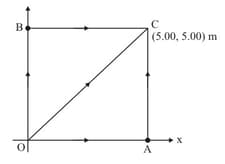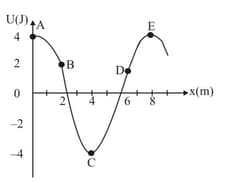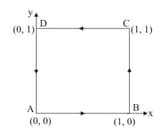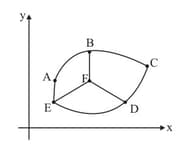B M Sharma Solutions for Chapter: Work, Energy and Power, Exercise 50: CONCEPT APPLICATION EXERCISE 8.3
B M Sharma Physics Solutions for Exercise - B M Sharma Solutions for Chapter: Work, Energy and Power, Exercise 50: CONCEPT APPLICATION EXERCISE 8.3
Attempt the practice questions on Chapter 8: Work, Energy and Power, Exercise 50: CONCEPT APPLICATION EXERCISE 8.3 with hints and solutions to strengthen your understanding. PHYSICS For Joint Entrance Examination JEE (Advanced) Mechanics I solutions are prepared by Experienced Embibe Experts.
Questions from B M Sharma Solutions for Chapter: Work, Energy and Power, Exercise 50: CONCEPT APPLICATION EXERCISE 8.3 with Hints & Solutions
A particle moves in the plane in figure under the influence of a friction force with magnitude and acting in the direction opposite to the particle’s displacement. Calculate the work done by the friction force on particle as it moves along the following closed paths:
(a) path followed by the return path
(b) path followed by and the return path
(c) path followed by the return path
(d) each of your three answers should be non-zero.
What is the significance of this observation?
A single conservative force acting on a particle varies as where and are constants and is in metre. Calculate the potential energy function associated with this force, taking at .
A potential energy function for a two-dimensional force is of the form Find the force that acts at the point
For the potential energy curve shown in figure. Determine whether the force is positive, negative, or zero at the five points indicated.
A particle is confined to move on -axis only and its mechanical energy is . The potential energy of the particle is given as . Find how this particle will move.
A particle can move along -axis under influence of a conservative force. The potential energy of the particle is given by where is co-ordinate of the particle expressed in meter. The particle is released at .
Find the maximum kinetic energy of the particle during subsequent motion.
Find the maximum coordinate of the particle.
A particle moves in plane under the action of a force . Calculate the work done in going in an anticlockwise direction along the side of a square of vertices , , and . Can this force be conservative?
A conservative force does of work in moving a particle from to via . The force does work when moving from to , for the path , for and for . What is the work done by the force when the particle moves from to ?




